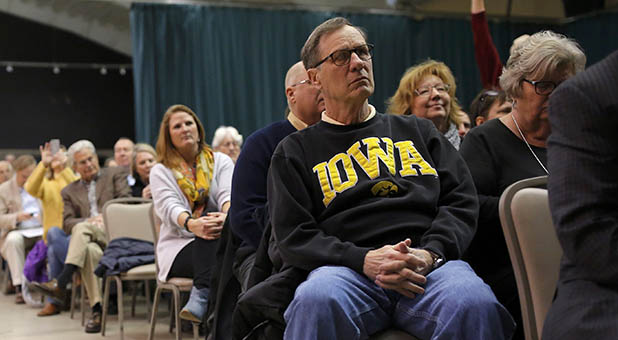Iowa GOP Official Explains New Delegate Rules
No one understands how Iowa’s delegates to the Republican National Convention are awarded better than David Chung.
The Iowa Republican Party State Central Committee member was the guy who led the process that resulted in how those delegates are handled. It’s a process he led both apprehensively and enthusiastically at the same time, as he noted recently on his Hawkeye GOP blog:
“Ron Paul’s 2012 candidacy for president put the Republican National Committee in full panic mode. At the 2012 Republican National Convention, the RNC changed the rules midstream to prevent Ron Paul from being officially nominated and earning a prime time speaking spot alongside with the eventual nominee, Mitt Romney. To prevent a possible repeat of the situation that gave Paul, the third place finisher on caucus night, a super majority of Iowa’s delegates the RNC ruled that every state must bind their National Convention delegates based on the results of their primary or caucus …
“Therefore, for the first time ever, we in Iowa are required to bind our delegates. This was not our choice, but in my role as Chairman of the party’s Organization Committee, I oversaw our committee’s effort to come up with a binding method that [was] in compliance …”
The rule in question is the RNC’s Rule 16(a)1, which states, in part:
Any statewide presidential preference vote that permits a choice among candidates for the Republican nomination for President of the United States in a primary, caucuses, or a state convention must be used to allocate and bind the state’s delegation to the national convention in either a proportional or winner-take-all manner …
As Chung points out in his blog, the Iowa GOP initially sought to only bind the delegates for the first ballot, but that was rejected by the RNC Rules Committee. The state party then worked out the current delegate rule, with the RNC’s approval, as part of an effort to guarantee Iowa would retain its first-in-the-nation status.
“The RNC passed a rule that required us to bind our delegates but also guaranteed us first-in-the-nation for 2016,” he wrote. “When I ran, unsuccessfully, for National Committeeman in 2012 I quickly learned something: Job #1 is retaining First-in-the-Nation! In my role on the State Central Committee, I am not going to do anything to push back against the very rule that gives us this privilege. There are already enough states working to take FITN away, the last thing I want to do is give them ammunition.”
So, here’s how the delegate allocation process works:
- The Iowa delegation is bound on the first ballot at the national convention to vote proportionally in accordance with the outcome of the Iowa Caucuses with the delegate allocation rounded to the nearest whole delegate. An unallocated delegate based on rounding will go to the candidate “closest to the rounding threshold.” The same principle is applied when an extra delegate is allocated due to rounding.
- Delegates are bound to the candidates who won them regardless of whether he remains in the race or not. This applies, even if the candidates have qualified to have their names placed in nomination at the Republican National Convention.
- However, if only one candidate has qualified for nomination at the national convention, all of Iowa’s delegates will be awarded to that candidate.
Chung explains the new Iowa delegate math further:
“It means that individual Iowa delegates will not vote on the first ballot at the convention. The chairman of the delegation will simply do the math and announce Iowa’s vote based on this rule.
“So, if only one candidate meets the threshold to be officially placed into nomination, they will receive all of Iowa’s votes.
“If more than one candidate is officially placed into nomination, then Iowa’s votes will be recorded in proportion to the caucus night totals. In other words, Iowa will cast some votes for candidates who have suspended their campaigns and are no longer running. There will be no recalculation, there is no opportunity for a candidate to release or pledge his votes for another.”
Chung said the rules, in his opinion, are “byzantine.” He said the rules governing how a candidate may qualify for nomination at the Republican National Convention are equally so. But, if Iowa wished to remain the first state in the presidential nominating process, its Republican leaders were determined to do whatever they could.
Currently, Iowa’s delegates have been awarded accordingly:
1. Ted Cruz 8 delegates
2. Donald Trump 7
3. Marco Rubio 7
4. Ben Carson 3
5. Rand Paul 1
6. Jeb Bush 1
7. Carly Fiorina 1
8. John Kasich 1
Even with Paul’s suspension of his campaign, he retains the one delegate vote, unless only single candidate is eligible for nomination at the national convention. A candidate must secure 1,237 delegate votes to win the GOP nomination.














































